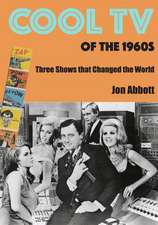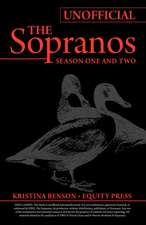Show and Biz: The market economy in TV series and popular culture (2000-2020)
Editat de María Blanco, Direttore Generale Alberto Mingardien Limba Engleză Hardback – 26 iul 2023
Preț: 540.89 lei
Preț vechi: 774.34 lei
-30% Nou
Puncte Express: 811
Preț estimativ în valută:
103.51€ • 112.40$ • 86.95£
103.51€ • 112.40$ • 86.95£
Carte tipărită la comandă
Livrare economică 22 aprilie-06 mai
Preluare comenzi: 021 569.72.76
Specificații
ISBN-13: 9781501393778
ISBN-10: 1501393774
Pagini: 302
Dimensiuni: 152 x 229 mm
Greutate: 0.57 kg
Editura: Bloomsbury Publishing
Colecția Bloomsbury Academic
Locul publicării:New York, United States
ISBN-10: 1501393774
Pagini: 302
Dimensiuni: 152 x 229 mm
Greutate: 0.57 kg
Editura: Bloomsbury Publishing
Colecția Bloomsbury Academic
Locul publicării:New York, United States
Caracteristici
Pedagogical tool to teach the basic principles of economics through the examples and narratives provided by TV series
Notă biografică
María Blanco is Associate Professor of Economic History and Institutions at Universidad San Pablo-CEU in Madrid, Spain.Alberto Mingardi is Associate Professor of the history of political thought at IULM University in Milan, Italy. He is also Director General of Istituto Bruno Leoni and a Presidential Scholar in Political Theory at Chapman University (Orange, Ca).
Cuprins
DedicationPrefaceMaría Blanco (Universidad CEU-San Pablo, Spain) and Alberto Mingardi (IULM University, Italy)1. Entrepreneurship and Free Enterprise in the Gilmore GirlsNur Baysal (University of St Andrews, UK)2. Supplies, Slaves, and Sex: Firefly and the Ethical Frontiers of EntrepreneurshipSarah Skwire (LibertyFund, USA)3. Entrepreneurship and the Market Economy in The Wire: Stringer's Ill-fated Second ChanceStefano Adamo (University of Banja Luka, Bosnia and Herzegovina)4. Growing Up with the Country: Deadwood and the Business of AmericaMichael Valdez Moses (Chapman University, USA)5. The Bourgeois Virtues in Deadwood: Challenging American IdeologyBart J. Wilson, Nicholas A. Callen, Jan Osborn, Max Schartz, Colin White (Chapman University, USA)6. Mad Men: An Anti-capitalistic Ode to the PresentLuigi Marco Bassani (University of Milan, Italy)7. Gossip Girl: The Business of Being FamousManuel Santos Redondo (Universidad Complutense, Spain)8. Looking Into the Jaws of Capitalism: Shark Tank and Economic TheoryPaul A. Cantor (University of Virginia, USA)9. Parks and Recreation: Mouse Rat, Snake Juice, and the Cones of DunshireDylan Pahman (Acton Institute, USA)10. The Newsroom Carlos Rodríguez Braun (Universidad Complutense, Spain)11. Clueless Innovators and Boring Managers: Popular Perceptions of Business in Halt and Catch FireNikolai Wenzel (Fayetteville State University, USA)12. StartUp on TVIrene Correas Sosa (Universidad CEU-San Pablo, Spain)13. Narcos: México: Drugs, Public Opinion, Venezuela, and "Neoliberalism"Fernando Claro14. A Tale of Two Villains: Finance and the State in the TV series BillionsCarlo Amenta (University of Palermo, Italy)15. Inequalities at the End of the World: Snowpiercer, Entrepreneurship and DisorderAlberto Mingardi (IULM University, Italy)Index
Recenzii
Razor-sharp analyses uncover the economic and political premises embedded in some of the most popular TV programs of the past two decades. This volume can significantly change the way we look at television-and economics.
There is a lot written about the cultural biases of TV and its complex relationship to entrepreneurial capitalism, but rarely in as broad-reaching, comprehensive, and well-documented a manner as in this collection. Show and Biz offers scholars in many fields exciting new perspectives about a subject of considerable cultural importance and demonstrable relevance.
Popular culture, television, and good economics are not often enough considered together. Show and Biz? is a breakthrough work which helps to remedy this longstanding gap. It is highly readable and entertaining as well as instructive.
There is a lot written about the cultural biases of TV and its complex relationship to entrepreneurial capitalism, but rarely in as broad-reaching, comprehensive, and well-documented a manner as in this collection. Show and Biz offers scholars in many fields exciting new perspectives about a subject of considerable cultural importance and demonstrable relevance.
Popular culture, television, and good economics are not often enough considered together. Show and Biz? is a breakthrough work which helps to remedy this longstanding gap. It is highly readable and entertaining as well as instructive.























